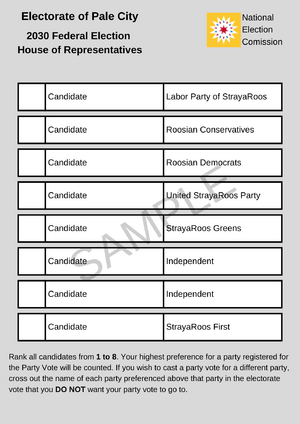Roosian Mixed-member proportional representation: Difference between revisions
StrayaRoos (talk | contribs) No edit summary |
StrayaRoos (talk | contribs) No edit summary |
||
| Line 3: | Line 3: | ||
Under the Roosian MMP system, single-member electorate seats are elected using single transferable vote, making up half of the seats in the House of Representatives, where the candidate with the least first preferences is eliminated until one candidate has 50.01% of the votes cast in an electorate. | Under the Roosian MMP system, single-member electorate seats are elected using single transferable vote, making up half of the seats in the House of Representatives, where the candidate with the least first preferences is eliminated until one candidate has 50.01% of the votes cast in an electorate. | ||
The party vote element involves the voter’s highest usable preference (i.e. highest-ranked party that has registered a party list with the NEC for that election), being added to the national tally. Then, all party votes will be combined to get a national party vote (NPV). All Parties with more than 2% of the NPV, or a party that has won at least one electorate seat, will have their vote counts transferred to the List seat allocation. The parties percentage of the national usable votes tally (i.e. Party votes cast for eligible parties) will be multiplied by the number of seats in parliament (currently 361), minus the count of seats won by independent candidates. The resulting number will be the entitlement of a party for that election. The list seats make up half+1 of seats in Parliament, and will be allocated to each party to ensure as many parties as possible reach their entitlement, ensuring proportionality. | The party vote element involves the voter’s highest usable preference (i.e. highest-ranked party that has registered a party list with the NEC for that election), being added to the national tally. Then, all party votes will be combined to get a national party vote (NPV). All Parties with more than 2% of the NPV, or a party that has won at least one electorate seat, will have their vote counts transferred to the List seat allocation. The parties percentage of the national usable votes tally (i.e. Party votes cast for eligible parties) will be multiplied by the number of seats in parliament (currently 361), minus the count of seats won by independent candidates. The resulting number will be the entitlement of a party for that election. The list seats make up half+1 of seats in Parliament, and will be allocated to each party to ensure as many parties as possible reach their entitlement, ensuring proportionality. The apportionment utilises a modified Largest Remainders method, although without a set quota being utilised in the calculation of the result. | ||
[[File:Roosian MMPv3 ballot.png|thumb|A sample ballot for the 2030 Roosian Federal Election, conducted under the third iteration of the Roosian MMP system]] | [[File:Roosian MMPv3 ballot.png|thumb|A sample ballot for the 2030 Roosian Federal Election, conducted under the third iteration of the Roosian MMP system]] | ||
[[Category:StrayaRoos]] | [[Category:StrayaRoos]] | ||
[[Category:Politics in StrayaRoos]] | [[Category:Politics in StrayaRoos]] | ||
Latest revision as of 03:20, 12 December 2024
Roosian Mixed-member proportional representation (Roosian MMP) is a mixed single vote electoral system used exclusively in the StrayaRoos House of Representatives which combines local winner-take-all elections with a compensatory tier with party lists, in a way that produces proportional representation overall.
Under the Roosian MMP system, single-member electorate seats are elected using single transferable vote, making up half of the seats in the House of Representatives, where the candidate with the least first preferences is eliminated until one candidate has 50.01% of the votes cast in an electorate.
The party vote element involves the voter’s highest usable preference (i.e. highest-ranked party that has registered a party list with the NEC for that election), being added to the national tally. Then, all party votes will be combined to get a national party vote (NPV). All Parties with more than 2% of the NPV, or a party that has won at least one electorate seat, will have their vote counts transferred to the List seat allocation. The parties percentage of the national usable votes tally (i.e. Party votes cast for eligible parties) will be multiplied by the number of seats in parliament (currently 361), minus the count of seats won by independent candidates. The resulting number will be the entitlement of a party for that election. The list seats make up half+1 of seats in Parliament, and will be allocated to each party to ensure as many parties as possible reach their entitlement, ensuring proportionality. The apportionment utilises a modified Largest Remainders method, although without a set quota being utilised in the calculation of the result.
